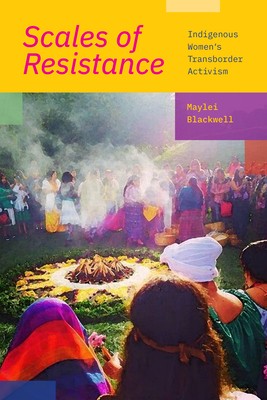
- We will send in 10–14 business days.
- Author: Maylei Blackwell
- Publisher: Duke University Press
- ISBN-10: 1478017961
- ISBN-13: 9781478017967
- Format: 15 x 22.6 x 2.3 cm, softcover
- Language: English
- SAVE -10% with code: EXTRA
Reviews
Description
In Scales of Resistance Maylei Blackwell narrates how Indigenous women's activism in Mexico and its diaspora weaves in and between local, national, continental, and transborder scales. Drawing on more than seventy testimonials and twenty years of fieldwork accompanying Indigenous women activists, Blackwell focuses on how these activists navigate the blockages to their participation and transform exclusionary spaces into scales of resistance. Blackwell shows how activists in Mexico and those in the migrant stream that runs from Oaxaca into California redefined women's roles in community decision-making. They did so by scaling down Indigenous autonomy to their own bodies, homes, and communities, grounding their political claims within Indigenous epistemologies and the gendered nature of social organization, and scaling up to regional, national, and continental contexts. This allowed them to place themselves at the heart of Indigenous resistance and autonomy, decolonizing gender hierarchies and creating new scales of participation. Blackwell reveals the importance of moving across different types of scale and contrasting colonial divisions of scale itself with Indigenous conceptions of scale, space, solidarity, and connection.
EXTRA 10 % discount with code: EXTRA
The promotion ends in 12d.04:18:36
The discount code is valid when purchasing from 10 €. Discounts do not stack.
- Author: Maylei Blackwell
- Publisher: Duke University Press
- ISBN-10: 1478017961
- ISBN-13: 9781478017967
- Format: 15 x 22.6 x 2.3 cm, softcover
- Language: English English
In Scales of Resistance Maylei Blackwell narrates how Indigenous women's activism in Mexico and its diaspora weaves in and between local, national, continental, and transborder scales. Drawing on more than seventy testimonials and twenty years of fieldwork accompanying Indigenous women activists, Blackwell focuses on how these activists navigate the blockages to their participation and transform exclusionary spaces into scales of resistance. Blackwell shows how activists in Mexico and those in the migrant stream that runs from Oaxaca into California redefined women's roles in community decision-making. They did so by scaling down Indigenous autonomy to their own bodies, homes, and communities, grounding their political claims within Indigenous epistemologies and the gendered nature of social organization, and scaling up to regional, national, and continental contexts. This allowed them to place themselves at the heart of Indigenous resistance and autonomy, decolonizing gender hierarchies and creating new scales of participation. Blackwell reveals the importance of moving across different types of scale and contrasting colonial divisions of scale itself with Indigenous conceptions of scale, space, solidarity, and connection.


Reviews